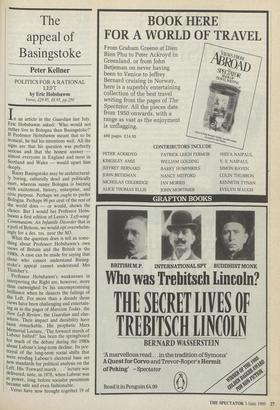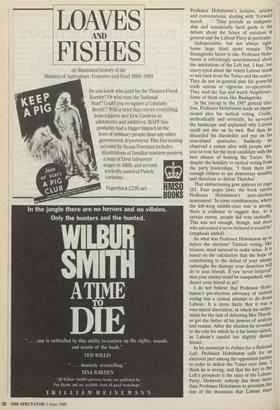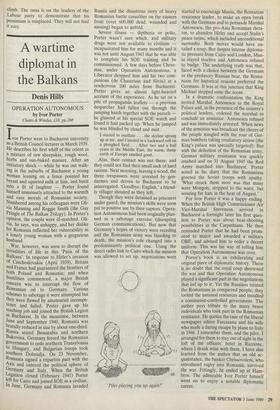The appeal of Basingstoke
Peter Kellner
POLITICS FOR A RATIONAL LEFT by Eric Hobsbawm
Verso, f29.95, f8.95, pp.250
In an article in the Guardian last July. Eric Hobsbawm asked: 'Who would not rather live in Bologna than Basingstoke?' If Professor Hobsbawm meant that to be ironical, he hid his intentions well. All the signs are that his question was perfectly serious and that the honest answer almost everyone in England and most in Scotland and Wales — would upset him deeply.
Rainy Basingstoke may be architectural- ly boring, culturally dead and politically inert, whereas sunny Bologna is buzzing with excitement, history, enterprise, and civic purpose. Perhaps we ought to prefer Bologna. Perhaps 99 per cent of the rest of the world does — or would, shown the choice. But I would bet Professor Hobs- bawm a first edition of Lenin's 'Left-wing. Communism: An Infantile Disorder that in a poll of Britons, we would opt overwhelm- ingly for a des. res. near the M3.
What the question does is tell us some- thing about Professor Hobsbawm's own views of Britain and the British in the 1980s. A case can be made for saying that those who cannot understand Basing- stoke's appeal cannot understand Mrs Thatcher's.
Professor Hobsbawm's weaknesses in interpreting the Right are, however, more than outweighed by his uncompromising brilliance when he dissects the failings of the Left. For more than a decade those views have been challenging and entertain- ing us in the pages of Marxism Today, the New Left Review, the Guardian and else- where. Their impact and durability have been remarkable. His prophetic Marx Memorial Lecture, 'The forward march of Labour halted?' has been the springboard for much of the debate during the 1980s about Labour's long-term decline. Its por- trayal of the long-term social shifts that were eroding Labour's electoral base set new standards for political analysis on the Left. His 'Forward march . . .' lecture was delivered, note, in 1978, when Labour was in power, long before socialist pessimism became safe and even fashionable.
Verso have now brought together 19 of
Professor Hobsbawm's lectures, articles and conversations, starting with 'Forward march . . .'. They provide an indispens- able and consistently lucid guide to the debate about the future of socialism in general and the Labour Party in particular. Indispensable, but not always right. Some large blind spots remain. The Basingstoke factor is one. Professor Hobs- bawm is refreshingly unsentimental about the institutions of the Left but, I fear, too starry-eyed about the voters Labour needs to win back from the Tories and the centre. They do not in general pine for powerful trade unions or vigorous co-operatives. They read the Sun and watch Neighbours. Some of them even like Basingstoke.
In the run-up to the 1987 general elec- tion, Professor Hobsbawm made an impas- sioned plea for tactical voting. Coolly, methodically and correctly, he surveyed the landscape and explained why Labour could not .win on its own. But then he discarded his theodolite and put on his rose-tinted spectacles. Suddenly he observed a nation alive with people anx- ious to vote for the local candidate with the best chance of beating the Tories. So, despite the hostility to tactical voting from the party leaderships, 'I think there are enough citizens to use democracy sensibly and therefore to defeat Thatcher'.
That embarrassing gem appears on page 183. Four pages later, the book carries Professor Hobsbawm's post-election assessment: 'In some constituencies, where the left-wing middle-class vote is strong, there is evidence to suggest that, to a certain extent, people did vote tactically. This was not enough, though, and those who advocated it never believed it would be (emphasis added). So what was Professor Hobsbawm up to before the election? Tactical voting, like treason, must succeed to make sense. It is based on the calculation that the hope of contributing to the defeat of your enemy outweighs the damage your desertion will ! do to your friends. If you 'never believed that your enemy could be vanquished, why desert your friend at all? I do not believe that Professor Hobs- bawm's pre-election advocacy of tactical voting was a cynical attempt to do down Labour. It is more likely that it was a rose-tinted aberration, in which his enthu- siasm for the task of defeating Mrs Thatch- er got the better of his powers of analysis and reason. After the election he reverted to the role for which he is far better suited, as Labour's candid but slightly distant friend. In his postscript to Politics for a Rational Left, Professor Hobsbawm calls for an electoral pact among the opposition parties in order to defeat the Tories next time. I think he is wrong, and that the key to the Left's prospects is the state of the Labour Party. However, nobody has done more than Professor Hobsbawm to proclaim the size of the mountain that Labour must
climb. The onus is on the leaders of the Labour party to demonstrate that his pessimism is misplaced. They will not find it easy.




















































 Previous page
Previous page